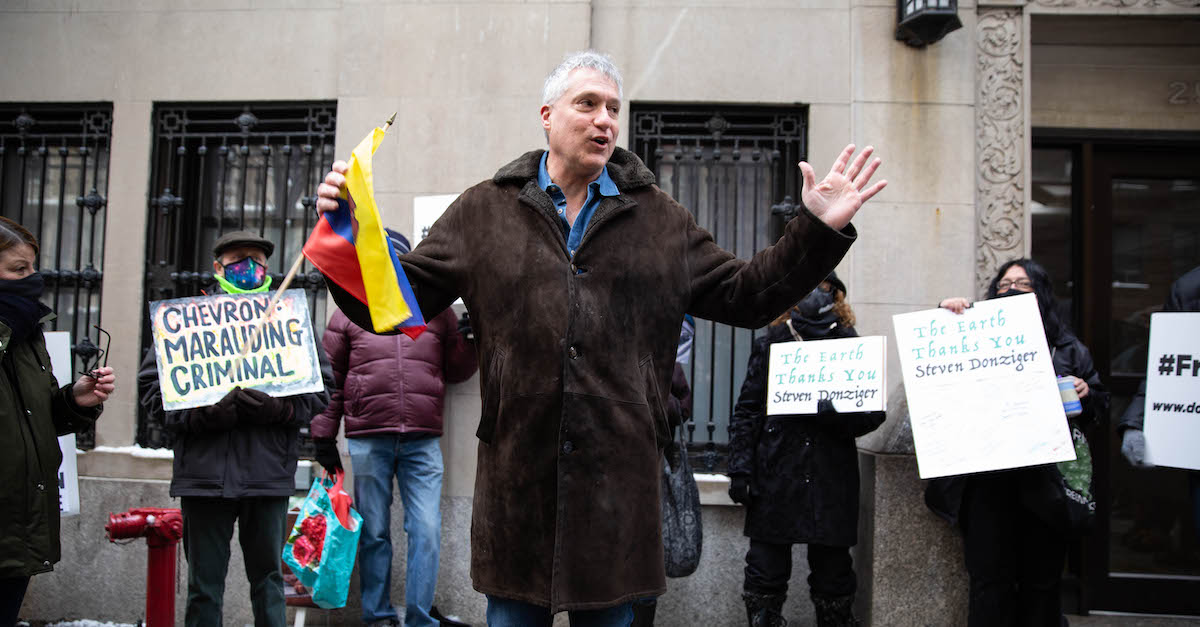
A now-disbarred lawyer who helped win a $9.5 billion judgment against Chevron in Ecuador was found guilty on Monday of six misdemeanor counts of criminal contempt, in the culmination of an unusual judge-ordered prosecution that began roughly two years ago.
Steven Donziger was part of a team of lawyers who sued Chevron’s predecessor Texaco in the Southern District of New York in 1993, on behalf of indigenous and farmer residents alleging massive oil pollution to the Ecuadorean Amazon. He since became the most visible face of the litigation and Chevron’s nemesis.
The case has taken many surprising turns since its inception, leading to the serious possibility of Donziger’s imminent incarceration. The charges carry a maximum penalty of six months in prison. Donziger’s critics argue that he crossed ethical lines in service of his client’s cause, and his supporters describe him as a “corporate political prisoner,” noting that he has spent more than 700 days so far under house arrest.
In a 245-page ruling, Senior U.S. District Judge Loretta Preska acknowledged the international controversy the case has engendered.
“This case, however, is wholly unconcerned with the debate regarding any responsibility Chevron might bear for that pollution,” she wrote. “Yet, this case is no less important to a society, like ours, that holds the rule of law among its cardinal virtues. Indeed, at stake here is the fundamental principle that a party to a legal action must abide by court orders or risk criminal sanctions, no matter how fervently he believes in the righteousness of his cause or how much he detests his adversary.”
Donziger described the ruling as a “travesty of justice” and a bid to “criminalize me and to send a message of intimidation to legitimate human rights lawyers who successfully challenge the major polluters of the fossil fuel industry.”
“The decision marks a sad day for the rule of law, for our democracy, and for our planet,” Donziger wrote in a statement. “The United States has now become one of those countries where environmental advocates are attacked, put in jail, or even murdered for doing their jobs successfully.”
The year that Chevron acquired Texaco, the oil giant successfully sought the transfer of the case to Ecuador in 2001. Donziger and his clients won that litigation in Ecuador’s rainforest city on 2011.
Since that time, Donziger has been the subject of a blistering counteroffensive by the oil giant. Chevron declared the ruling fraudulent and sued him under federal anti-racketeering law. The company accused Donziger of obtained the verdict through fraudulent and corrupt means. Donziger has maintained his innocence and depicts the allegations against him as a “well-financed corporate attack campaign” to “demonize” him.
In 2014, U.S. District Judge Lewis Kaplan found broadly in Chevron favor in a nearly 500-page ruling against Donziger that eventually led to his disbarment.
Roughly half a decade later, Judge Kaplan referred Donziger to the U.S. Attorney’s office for alleged violations of his orders in August 2019. Kaplan accused Donziger of flouting orders, including those demanding that the lawyer to turn over his passport, submit his electronic devices for forensic inspection, and transfer shares in a company created to collect the Ecuadorean judgment.
When the U.S. Attorney’s office declined to take up the contempt case, the judge would not take no for an answer. In an extremely rare maneuver, Kaplan tapped a private law firm to prosecute Donziger, who was quick to note that this firm, Seward & Kissel, previously counted Chevron as a client. Judge Preska rejected claims of a conflict of interest, saying Chevron paid the firm $30,000, an amount she described as a “de minimis” slice of firm’s total revenue.
Donziger describes himself as the “only lawyer in U.S. history to be charged with criminal contempt after completely complying with a civil order upon which it is based,” as well as the only one subject to such a private prosecution regime ever in the Southern District of New York.
Judge Preska did not dispute that was the case, but she ruled that the case’s “uniqueness” was not reason to dismiss it.
“The Court does not question the sincerity of Mr. Donziger’s espousal of his clients’ cause,” Judge Preska wrote. “Nor does it quarrel with the sincerity of his belief that he has been treated unfairly by Chevron. But ‘a lawyer, of all people, should know that in the face of a perceived injustice, one may not take the law into his own hands.’ By repeatedly and willfully defying Judge Kaplan’s orders, that is precisely what Mr. Donziger did. It’s time to pay the piper.”
In both his civil lawsuit and criminal prosecution, Donziger asked for and was denied trials by jury. Chevron dropped its claim for monetary damages shortly before trial, which would have triggered Donziger’s constitutional right to a jury. The misdemeanor charges were deemed too light to mandate a jury of Donziger’s peers.
Finding Donziger guilty of each of the six counts of criminal contempt, Judge Preska rejected the now-disbarred attorney’s claims that the fix was in from the start.
“Contrary to Mr. Donziger’s assertion that his conviction was ‘pre-ordained,’ the Court finds him guilty on each count for one reason and one reason only: Mr. Donziger did that with which he is charged. Period,” she wrote.
Preska gave the parties three days to set a schedule for sentencing, which she said should take into account Donziger’s repeated requests to be released from pre-trial home confinement.
Update—July 26 at 1:36 p.m. Eastern Time: This story has been updated to include Donziger’s statement.
Listen to Law&Crime’s podcast “Objections” for background on this case:
Read the ruling below:
(Photo courtesy of Steven Donziger)